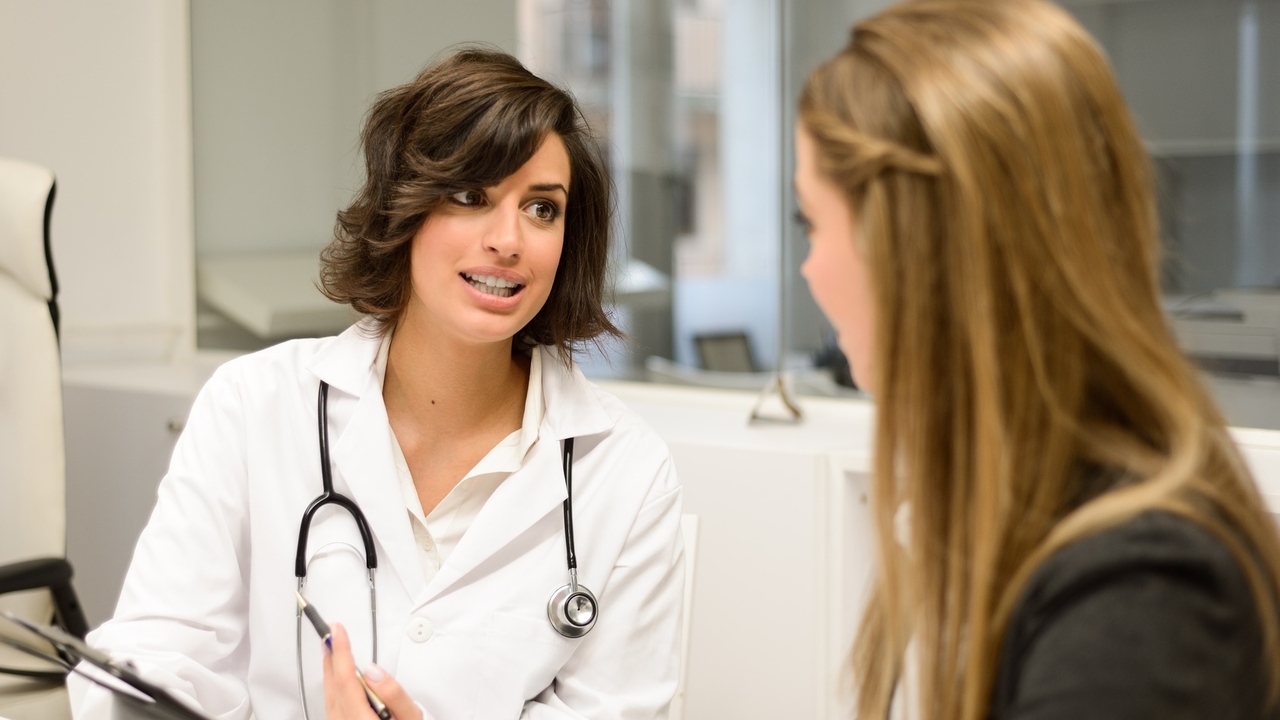Dr. Collins, a gynecologic oncologist at Advocate Christ Medical Center in Oak Lawn, Illinois, has teamed up with Mandy Moore to support the National Cervical Cancer Public Education Campaign.
From the EmpowHER.com studios, here is Todd Hartley.
Todd Hartley:
Hi and thank you for joining us at EmpowHER where we are improving health and changing lives, and I am joined right now by Dr. Yvonne Collins; she is a gynecological oncologist at Advocate Christ Medical Center in Oak Lawn, Illinois and we are going to talk about cervical cancer – one of those preventable types of cancer and the National Cervical Cancer Public Education Campaign that’s sponsored by The Gynecologic Cancer Foundation, along with GlaxoSmithKline.
For more information for what we are talking about, feel free to go to CervicalCancerCampaign.org/RealityCheck. Hi Dr. Collins.
Dr. Yvonne Collins:
Good morning.
Todd Hartley:
Good morning! Now Dr. Collins, let’s start at the ground level on this subject. Now before we get into prevention, what exactly is cervical cancer?
Dr. Yvonne Collins:
Well cervical cancer is a preventable cancer. It’s a cancer that starts at the cervix. It’s where you begin to have infection with HPV and once the cells are infected, you develop low grade lesions of the cervix that are precancerous, and high-grade lesions of the cervix that are precancerous and then cervical cancer and the goal is that we now know that cervical cancer is a speculating cause of cancer related death for women in their 20s and 30s. So we want to get the word out in terms of prevention and screening, vaccination when necessary, and to make sure that patients are talking with their healthcare providers about how to decrease their risks for cervical cancer.
Todd Hartley:
The second leading cause of deaths for women in their 20s and 30s. That’s startling!
Dr. Yvonne Collins:
It’s very startling and the fact that we can prevent it. So we want to make sure that women know they can prevent this disease.
Todd Hartley:
Now I hear, as you just mentioned, it’s one of the most preventable types of cancer and I really hate to ask this question because I don’t want women to look at the odds and then not consider prevention but, I need to ask you, just how common is cervical cancer?
Dr. Yvonne Collins:
So cervical cancer is estimated for 2010 we are going to have approximately 12,000 cases of cervical cancer and approximately 3,000 to 4,000 women are going to die from the disease. So when you look numerically, it may not sound astounding, but the fact that 4,000 women this year will die unnecessarily due to a preventable cancer I think is the more important thing and women don’t think they are at risk right now. 85% of the women we surveyed don’t think they are at risk. However, most women are at risk.
Todd Hartley:
Wow. So how can women reduce their risk of developing cervical cancer? Really, that’s the big question, isn’t it?
Dr. Yvonne Collins:
Absolutely. So PAP smear screening – make sure you get your Pap smears routinely. Vaccination in areas and in patients where they can be vaccinated, lifestyle modifications, talking with your healthcare provider about each of those things and doing what you can do as a patient to make sure that you do your part in decreasing your risk.
Todd Hartley:
So, getting a regular Pap smear, limiting the number of sexual partners you have, quit smoking if you are currently smoking, use a condom if you are sexually active, right? I mean those are all big key areas. How about, get the HPV vaccine?
Dr. Yvonne Collins:
Absolutely. We know that because this cancer is preventable; we know that it’s caused by the HPV virus; definitely. It’s nice that women now have options, more than one option in terms of HPV vaccinations. So, absolutely. For those women, once they make that decision with their healthcare provider, vaccination is also a good option.
Todd Hartley:
Now doctor I know we have already discussed this but it’s such a huge part of the topic. Let’s again talk about testing for cervical cancer. What types of tests are available for detecting cervical cancer and how often should a woman get it?
Dr. Yvonne Collins:
So Pap smear screening is indeed the test to check for precancerous cells. I think more important than when women get screened, the fact that they get screened. With the campaign, we found that women very commonly don’t know where their cervix is; they don’t know why they are being screened; they don’t know what the screening is for. So I think education and awareness becomes very important, in addition to screening.
We have to help women and educate them so that they know where their cervix is. That they understand why they are getting a Pap smear in terms of identifying precancerous cells because those precancerous cells and the treatments related to those can sometimes decrease the ability of women to protect their cervical health.
Also in the campaign, we found that 70% of women wanted to have children. Some of the procedures that are done on the cervix for precancerous cells decrease their ability to be able to carry a pregnancy to term, and I think it’s very important for young women to understand all of those issues now, as we talk in addition about screening.
Todd Hartley:
Now, as a gynecological oncologist, can you give the listeners just a few useful tips or maybe a tool that they can use when being in their doctor’s office? How to bring up this subject; how to make sure that they are getting the proper test regularly? How would you recommend the women do that?
Dr. Yvonne Collins:
Well first of all, for the women that may listen to this, it’s very important that first of all they gain information, and I encourage them to go to the website, so cervicalcancercampaign.org/realitycheck – that way you get the basic information in terms of what your risk is, how HPV is transmitted. From there, understanding the important of screening. Talking to your healthcare provider about why you are having the PAP smear, what’s they are looking for, in addition to additional testing they may be doing at that time.
Also understanding the importance of vaccination. Talking with your healthcare provider about whether you are a candidate for vaccination, and then all of those lifestyle modifications we talked about. When your provider asks you, “Are you a smoker?” be honest in identifying that you are a smoker; identifying the number of sexual partners that you have; having a really healthy conversation with your healthcare provider so that you can identify your risk and then work together with your provider to eliminate or decrease that risk.
Todd Hartley:
Dr. Collins, I have interviewed women with cervical cancer and gynecological oncologists and both of them have stressed the importance that when women seek out a gynecological oncologist to treat them, can you explain to the listeners why that’s a crucial piece to the treatment puzzle?
Dr. Yvonne Collins:
So a gynecologic oncologist is a provider that takes care of women that have precancerous lesions of anywhere in the female genital tracts so we talk about the outside lips of the vagina, the vulva, the vagina itself, the cervix, the uterus, the ovary, the fallopian tube, the lining of the abdominal cavity, and when we look statistically, we know that patients who are taken care of by a gynecologic oncologist, when they have those cancers, tend to do better in terms of survival.
And when we look at survival we know that that’s the difference that we want to make for our patients. What we also found is that education, as in the campaign, women are not really cognisant of their body and we want them to also learn the importance of opinion of a gynecologic oncologist, but also talking with your provider is very important and I think education is the beginning of that conversation.
Todd Hartley:
Can you talk briefly on the scarcity of gynecological oncologist? I mean, I know there’s, in this city that I happen to be, in Phoenix, Arizona, there is only seven, so how rare is it?
Dr. Yvonne Collins:
So, actually we are a sub-specialty of OB/GYN. The last count that we got at our annual meeting is probably a thousand in the United States. There are some cities that are saturated; there are some cities where there’s a scarcity and so it’s very important, again, when you go to the cervicalcancercampaign.org website, there’s ‘find a doctor’ tab that allows you to identify gynecologic oncologist in your area. So, about a thousand of us - nationally.
Todd Hartley:
Now before we say goodbye and encourage women to take action on their own and be their own best advocate, can you give us, once again, how to reduce your risks of cervical cancer?
Dr. Yvonne Collins:
So number one – education. We want women to be informed. We want women to understand the importance of Pap smear screening. We want women to understand the importance of vaccination when indicated. We want women to understand the importance of lifestyle modifications – the number of sexual partners, the smoking, the follow-up of abnormal Pap smear, but we also want women to talk to their providers and begin to become their own advocates and ask questions and encourage patients to be empowered against this disease because cervical cancer, as we said, is the second leading cause of cancer-related death for women in their 20s and 30s and it’s a preventable cancer. So I want each and every woman to take an active role in the advocacy against cervical cancer.
Todd Hartley:
Well she is Dr. Yvonne Collins. She is a gynecological oncologist at Advocate Christ Medical Center in Oak Lawn, Illinois. Now for more information about National Cervical Cancer Public Education Campaign, sponsored by the Gynecologic Cancer Foundation along with GlaxoSmithKline go to, www.cervicalcancercampaign.org/realitycheck.
Dr. Collins, thank you so much for helping us empower women.
Dr. Yvonne Collins:
Thank you very much.
Check Out Mandy Moore's Cervical Cancer Awareness Video Interview



